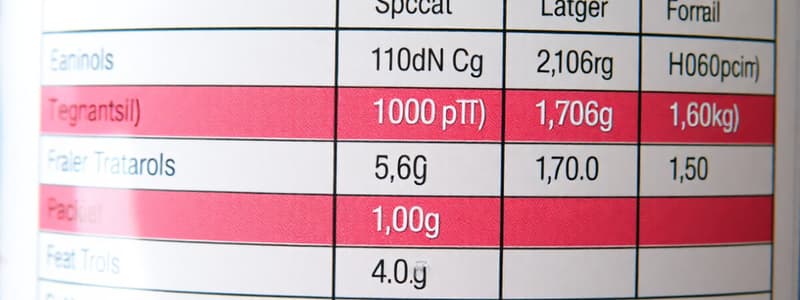Podcast
Questions and Answers
What color does the biuret indicator change to in the presence of protein?
What color does the biuret indicator change to in the presence of protein?
- Red
- Pink or Purple (correct)
- Green
- Blue
Potential energy is the energy of movement.
Potential energy is the energy of movement.
False (B)
What is it called when one form of energy is converted into another?
What is it called when one form of energy is converted into another?
Energy transformation
Chemical energy is stored in the __________ bonds that hold the atoms together.
Chemical energy is stored in the __________ bonds that hold the atoms together.
Match the following forms of energy with their descriptions:
Match the following forms of energy with their descriptions:
What is the primary source of short-term energy for the body?
What is the primary source of short-term energy for the body?
Fiber can be digested and is a rich source of energy.
Fiber can be digested and is a rich source of energy.
Name one food source of saturated fats.
Name one food source of saturated fats.
___ is a micronutrient that helps regulate metabolism.
___ is a micronutrient that helps regulate metabolism.
Which nutrient provides long-term energy when carbohydrates are used up?
Which nutrient provides long-term energy when carbohydrates are used up?
Match the nutrient with its function:
Match the nutrient with its function:
The human body requires 2-3 liters of water daily.
The human body requires 2-3 liters of water daily.
What is the energy value measurement commonly used for nutrients?
What is the energy value measurement commonly used for nutrients?
Flashcards
Nutrients
Nutrients
Substances that provide energy, build and repair tissues, regulate metabolism, and transport substances within the body.
Carbohydrate
Carbohydrate
A macronutrient that provides short-term energy. It can be simple (sugar) or complex (starch).
Sugar
Sugar
A simple carbohydrate that provides a quick burst of energy. Found in fruits, vegetables, honey, juice, and candy.
Starch
Starch
Signup and view all the flashcards
Fat
Fat
Signup and view all the flashcards
Protein
Protein
Signup and view all the flashcards
Vitamin
Vitamin
Signup and view all the flashcards
Mineral
Mineral
Signup and view all the flashcards
Cellular Respiration
Cellular Respiration
Signup and view all the flashcards
Basal Metabolism
Basal Metabolism
Signup and view all the flashcards
Energy for Physical Activities
Energy for Physical Activities
Signup and view all the flashcards
Indicators
Indicators
Signup and view all the flashcards
Color Change Indicator
Color Change Indicator
Signup and view all the flashcards
Gas Release Indicator
Gas Release Indicator
Signup and view all the flashcards
Precipitate Formation Indicator
Precipitate Formation Indicator
Signup and view all the flashcards
Energy Change Indicator
Energy Change Indicator
Signup and view all the flashcards
Biuret Test
Biuret Test
Signup and view all the flashcards
Chemical Energy
Chemical Energy
Signup and view all the flashcards
Kinetic Energy
Kinetic Energy
Signup and view all the flashcards
Energy Transformation
Energy Transformation
Signup and view all the flashcards
Study Notes
Nutrients
- A nutrient is a substance that the body needs.
- The body requires nutrients for energy, tissue building/repair, regulating metabolism, and transporting substances.
- A balanced diet ensures the body receives all necessary nutrients.
Carbohydrates
- Carbohydrates are macronutrients that include sugar, starch, and fiber.
- Sugar and starch provide short-term energy for the body.
- Sugar (simple carbohydrate) provides quick energy, found in fruits, vegetables, honey, juice, and candy.
- Starch (complex carbohydrate) provides energy over a longer period, found in pasta, bread, cereals, rice, legumes, tubers, and root vegetables.
- Fiber cannot be digested but aids in preventing constipation, found in fruits, vegetables, and whole grain cereals.
Fats
- Fat is a macronutrient that provides sustained, long-term stored energy.
- Found in oils, butter, margarine, salad dressings, cream, nuts, cheese, meat, fries, chips, and pastries.
- Saturated and trans fats should be limited.
Proteins
- Protein is a macronutrient used for building and repairing tissues and providing energy when other sources are unavailable.
- Found in meat, poultry, fish, eggs, legumes, tofu, nuts, and other sources.
Vitamins
- Vitamins are micronutrients that help regulate metabolism.
- Metabolism is the process of converting food into energy for the body.
- Vitamins are found in fruits, vegetables, meats, meat substitutes, milk, nuts, and other foods.
Minerals
- Minerals are micronutrients that help regulate metabolism.
- Found in fruits, vegetables, legumes, milk, meats, and seafood.
- Examples of minerals include calcium, iron, magnesium, zinc, and potassium.
Water
- Water helps regulate metabolism and transports substances within the body.
- The human body requires 2-3 liters of water daily.
- Water is present in almost all foods but is high in beverages, fruits, and vegetables.
Energy Value
-
Carbohydrates, fats, and proteins all provide energy to cells.
-
Energy is measured in calories or kilojoules (kJ).
-
1 calorie = 4.18 kJ
-
Each nutrient provides a standard amount of energy per gram. Carbohydrates = 17 kJ/g, Protein = 17 kJ/g, Fat = 37 kJ/g.
Cellular Respiration
- Cellular respiration is the chemical reaction that releases stored energy from nutrients.
- This process uses glucose (sugar) and oxygen to produce carbon dioxide, water, and energy in the form of ATP.
Energy Needs
- The average daily energy requirement for a 13-15-year-old adolescent is 10,500 kJ (approximately 2500 calories).
- Energy is needed for basal metabolism, physical activities, and digestion/absorption.
- To maintain weight, energy consumed must equal energy expended.
- To gain weight, energy consumed must exceed energy expended.
- To lose weight, energy expended must exceed energy consumed.
Indicators
- Indicators are substances that react chemically in the presence of a specific substance, used to detect its presence.
- Good indicators produce detectable reactions (e.g., color change, gas release, precipitate formation, energy variation).
- Examples of everyday indicators: pregnancy tests, breathalyzers, smoke detectors, and pH testing kits.
- Specific tests including the Biuret test for proteins. A positive result is a pink/purple color change.
Forms of Energy
- Energy is essential for work and motion.
- It cannot be created or destroyed, only transformed.
- Forms of energy:
- Chemical energy: stored in chemical bonds.
- Mechanical energy: related to movement and position.
- Thermal energy: stored due to the internal movement of particles.
- Radiant energy: carried by light and electromagnetic waves.
- Energy transformation: Changing from one form of energy to another.
Studying That Suits You
Use AI to generate personalized quizzes and flashcards to suit your learning preferences.




